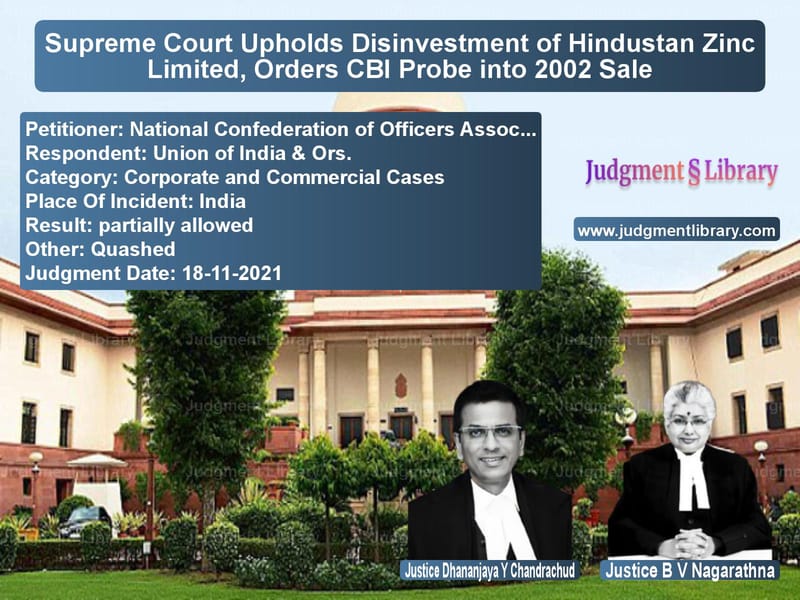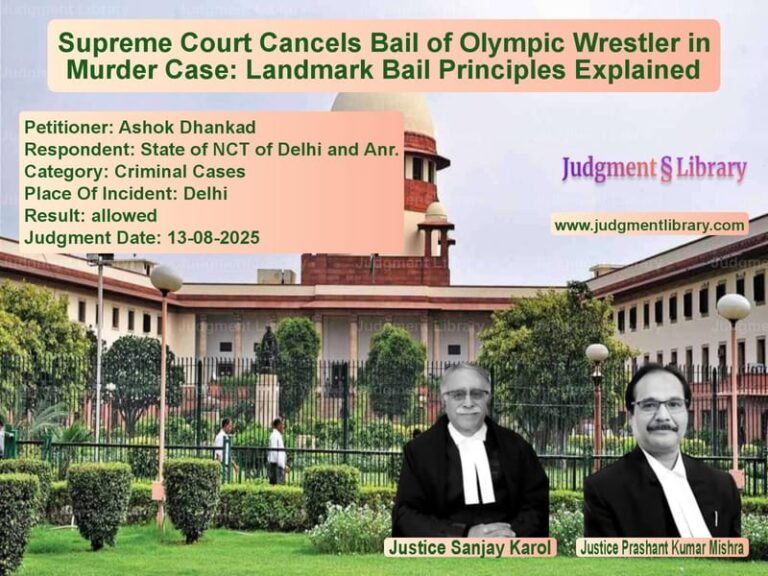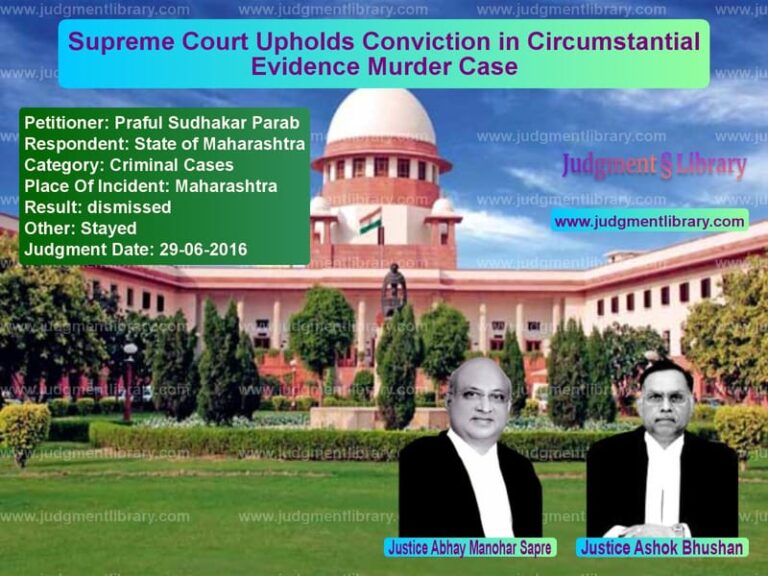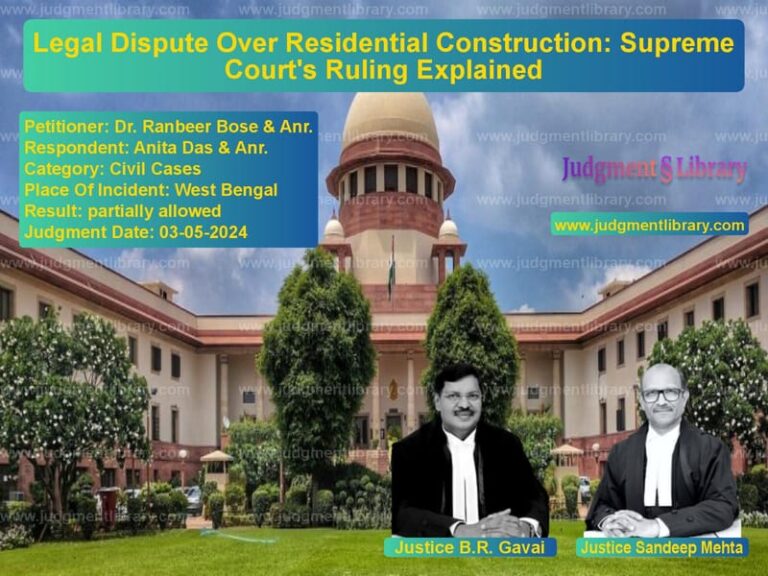Supreme Court Upholds Disinvestment of Hindustan Zinc Limited, Orders CBI Probe into 2002 Sale
The Supreme Court of India has delivered a significant judgment in the case of National Confederation of Officers Association of Central Public Sector Enterprises & Ors. vs. Union of India & Ors.. The case revolved around the Union Government’s decision to disinvest its remaining 29.54% stake in Hindustan Zinc Limited (HZL) and allegations of irregularities in the 2002 sale of 26% shares to Sterlite Opportunities & Ventures Ltd. (SOVL). While upholding the disinvestment, the Court has ordered a CBI investigation into the 2002 sale, citing prima facie evidence of procedural irregularities.
Background of the Case
HZL was a public sector enterprise involved in the mining and production of zinc and lead. The company was originally nationalized under the Metal Corporation (Nationalisation and Miscellaneous Provisions) Act, 1976, which aimed to ensure government control over strategic mineral resources. However, as part of the broader economic liberalization agenda, the Indian government began a phased disinvestment of HZL’s shares.
Disinvestment Timeline
- 1991-92: The government sold 24.08% of its shares in HZL through a public offer.
- 2002: A further 26% stake was sold to SOVL, effectively transferring management control to the private entity.
- 2003: SOVL exercised its call option and acquired an additional 18.92% shares, increasing its stake to 64.92%.
- 2012: The government announced its intent to sell its remaining 29.54% stake in HZL.
- 2013: The CBI initiated a preliminary enquiry into allegations of irregularities in the 2002 disinvestment.
- 2017: The CBI filed a closure report, stating that no criminal case was warranted.
Petitioner’s Arguments
The petitioners, led by the National Confederation of Officers Association, challenged the proposed sale of the residual 29.54% stake in HZL, arguing that:
- The disinvestment was illegal as it violated the provisions of the Nationalisation Act, 1976.
- The government’s 29.54% stake ensured a level of control over key corporate decisions at HZL, which was crucial for safeguarding national interests.
- The 2002 sale of 26% shares to SOVL was riddled with irregularities, including undervaluation of assets and favoritism in the bidding process.
- The government could not legally privatize a company nationalized by Parliament without enacting an amendment to the Nationalisation Act.
- The CBI’s closure of the preliminary enquiry into the 2002 sale was unjustified and required further scrutiny.
Respondent’s Arguments
The Union Government and SOVL defended the disinvestment process, asserting that:
- The government had every right to sell its remaining stake in HZL as it was no longer a government company under the Companies Act.
- The sale process was in line with the government’s disinvestment policy and was conducted transparently.
- The petition was barred by res judicata since similar challenges had been dismissed earlier.
- The CBI’s closure of the preliminary enquiry into the 2002 sale was final, and no further investigation was necessary.
Supreme Court’s Observations
1. Validity of the Disinvestment
The Court held that the government’s decision to sell its remaining 29.54% stake in HZL was lawful. It noted:
“The Nationalisation Act, 1976, does not impose any legal bar on the government selling its shares in HZL. Once HZL ceased to be a government company in 2002, the government could exercise its rights as a shareholder like any other investor.”
The Court rejected the argument that parliamentary approval was needed, distinguishing the case from earlier rulings where public sector enterprises were privatized while still classified as government companies.
2. CBI Probe into the 2002 Sale
While upholding the disinvestment, the Court found prima facie evidence of irregularities in the 2002 sale of 26% shares to SOVL. The Court observed:
“There are serious questions regarding the valuation of HZL’s assets, procedural lapses in the bidding process, and possible favoritism in the selection of SOVL as the strategic partner.”
The Court pointed out discrepancies in the CBI’s findings:
- The initial reserve price for the shares was lowered without justification.
- The bidding process lacked sufficient competition, with only two final bidders.
- Key assets of HZL were allegedly undervalued during the disinvestment.
- The valuation did not fully account for HZL’s ore reserves and mineral resources.
- There was conflicting advice from government officials on the sale process.
Final Judgment
The Supreme Court ruled:
- The government can proceed with selling its residual 29.54% stake in HZL in the open market.
- The principles of res judicata do not apply, as the petition raised fresh legal grounds.
- The CBI must register a regular case and conduct a full-fledged investigation into the 2002 sale.
- The CBI must submit quarterly status reports to the Court.
Implications of the Judgment
This ruling has far-reaching implications for both disinvestment policy and corporate governance in India:
- Clarity on Disinvestment: The ruling reaffirms the government’s right to sell its minority stakes in companies that are no longer classified as public sector enterprises.
- Accountability in Privatization: The order for a CBI investigation underscores the importance of ensuring transparency and fairness in the sale of public assets.
- Investor Confidence: The Court’s approval of the disinvestment may encourage foreign and domestic investors by providing clarity on the government’s policy direction.
- Role of Public Interest Litigation: The judgment demonstrates that while PILs can be used to challenge government decisions, they must be backed by substantial legal grounds.
Conclusion
The Supreme Court’s ruling strikes a balance between allowing economic liberalization through disinvestment and ensuring accountability in public asset sales. By upholding the sale of HZL’s remaining shares while ordering a CBI probe into past irregularities, the Court reinforces the principle that privatization must be transparent and legally sound.
Petitioner Name: National Confederation of Officers Association of Central Public Sector Enterprises & Ors..Respondent Name: Union of India & Ors..Judgment By: Justice Dhananjaya Y Chandrachud, Justice B V Nagarathna.Place Of Incident: India.Judgment Date: 18-11-2021.
Don’t miss out on the full details! Download the complete judgment in PDF format below and gain valuable insights instantly!
Download Judgment: national-confederati-vs-union-of-india-&-ors-supreme-court-of-india-judgment-dated-18-11-2021.pdf
Directly Download Judgment: Directly download this Judgment
See all petitions in Company Law
See all petitions in Corporate Compliance
See all petitions in unfair trade practices
See all petitions in Mergers and Acquisitions
See all petitions in Bankruptcy and Insolvency
See all petitions in Judgment by Dhananjaya Y Chandrachud
See all petitions in Judgment by B.V. Nagarathna
See all petitions in partially allowed
See all petitions in Quashed
See all petitions in supreme court of India judgments November 2021
See all petitions in 2021 judgments
See all posts in Corporate and Commercial Cases Category
See all allowed petitions in Corporate and Commercial Cases Category
See all Dismissed petitions in Corporate and Commercial Cases Category
See all partially allowed petitions in Corporate and Commercial Cases Category







